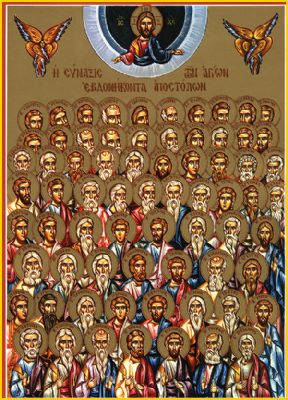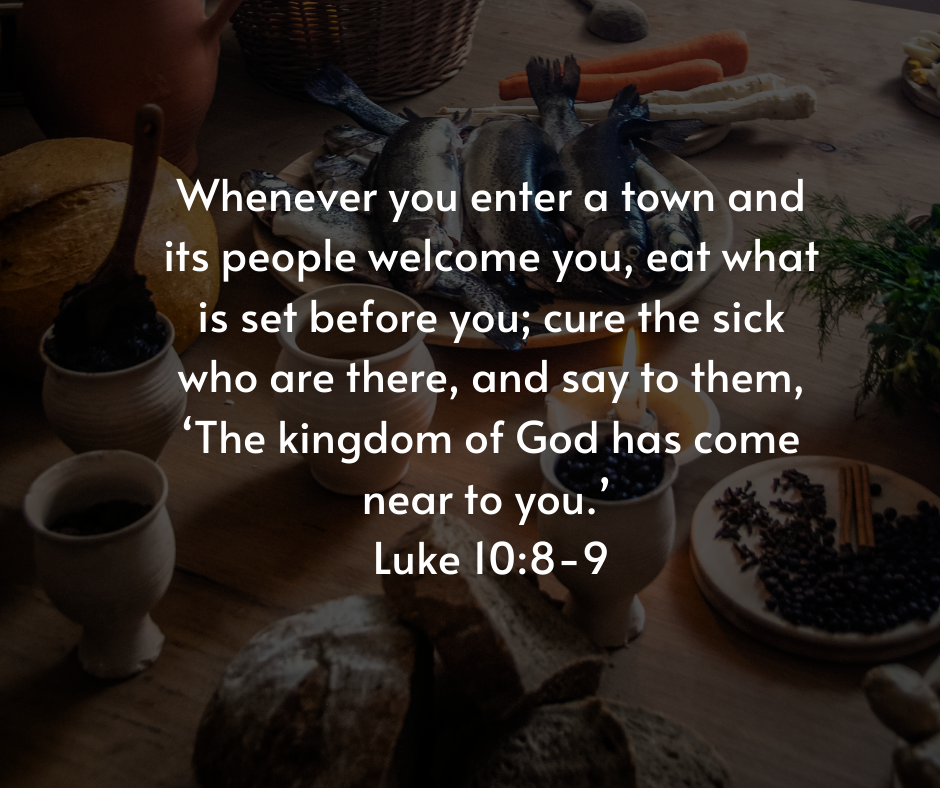Beyond Preferences and Routines
Luke 10:1-11, 16-20
Fourth Sunday after Pentecost
Analysis by Ben Williams
1After this the Lord appointed seventy others and sent them on ahead of him in pairs to every town and place where he himself intended to go. 2He said to them, “The harvest is plentiful, but the laborers are few; therefore ask the Lord of the harvest to send out laborers into his harvest. 3Go on your way. See, I am sending you out like lambs into the midst of wolves. 4Carry no purse, no bag, no sandals; and greet no one on the road. 5Whatever house you enter, first say, ‘Peace to this house!’ 6And if anyone is there who shares in peace, your peace will rest on that person; but if not, it will return to you. 7Remain in the same house, eating and drinking whatever they provide, for the laborer deserves to be paid. Do not move about from house to house. 8Whenever you enter a town and its people welcome you, eat what is set before you; 9cure the sick who are there, and say to them, ‘The kingdom of God has come near to you.’ 10But whenever you enter a town and they do not welcome you, go out into its streets and say, 11‘Even the dust of your town that clings to our feet, we wipe off in protest against you. Yet know this: the kingdom of God has come near.’”
16“Whoever listens to you listens to me, and whoever rejects you rejects me, and whoever rejects me rejects the one who sent me.” 17The seventy returned with joy, saying, “Lord, in your name even the demons submit to us!” 18He said to them, “I watched Satan fall from heaven like a flash of lightning. 19See, I have given you authority to tread on snakes and scorpions, and over all the power of the enemy; and nothing will hurt you. 20Nevertheless, do not rejoice at this, that the spirits submit to you, but rejoice that your names are written in heaven.”
We are called to take a seat at the table that has already been set, learn to eat what is set before us, and dig in!
DIAGNOSIS: A Consumer Hospitality
Step 1: Initial Diagnosis (External Problem): Poor Table Manners
Grounding: “Go on your way. See, I am sending you out like lambs into the midst of wolves. Carry no purse, no bag, no sandals…” (vv. 3-4). Those sent by Jesus have a daunting task ahead of them. Vulnerable, exposed, and frankly uncomfortable, the “sent ones” are to go out and rely on the hospitality of others; to be guests in others’ home; to eat what is set before them—a difficult thing for first-century Jewish folk to fully embrace (see Acts 10).
Tracking: “Eat what is set before you,” sounds simple enough. And yet, as many parents of toddlers can attest, the table becomes the setting of a great power struggle. Over steamed vegetables and plastic plates, both parent and child want control. And, even if the child enjoys the broccoli one day, a similar response is not guaranteed the next day. Of course, that toddler willfulness fades with age and maturity. But, not entirely. Control over preferences and routines occupies much of our adult will.
Step 2: Advanced Diagnosis (Internal Problem): Prioritizing Preferences
Grounding: “Remain in the same house… Do not move about from house to house” (v. 7) When Jesus sends the seventy out, he expects them to be welcomed and rejected. The ministry of the “sent ones” is dependent on the hospitality of others, not their preferences. Regardless of ability, status, or identity (9:46-56) those sent by Jesus are to be humble guests, not choosy consumers.
Tracking: Being hosted can expose the toddler willfulness in even the most mature adult. After all, getting precisely what is desired is the water in which consumer-oriented societies swim. Don’t like your neighbors? Buy a new home in a different neighborhood. Don’t care for one particular neighbor? Fences make for great neighbors, especially large privacy fences. Even in the church, folks can “shop around” for a community that suits their preferences. But, when being hosted, the self-preferential heart is hindered and our true fear, love, and trust is exposed.
Step 3: Final Diagnosis (Eternal Problem): Rejecting Our Host
Grounding: “…whoever rejects me rejects the one who sent me” (v. 16). Hospitality is the relationship between host and guest. It is a relational ecology that often pre-dates the guest’s arrival. If such an ecology is unhospitable because of the actions of the host, then the “sent ones” are to shake the dust off their feet and move on. But what if the “sent ones” reject the hospitality of their welcoming host? Would they not also be rejecting the hospitality of Christ?
Tracking: It is far more difficult to be a gracious guest than to be a gracious host. When every event, occasion, or circumstance is on “our turf,” we are utterly missing out on experiencing God in the multitude of places God shows up. By rejecting our calling to be hosted, we reject the host of all creation—and the feast of redemption that he sets before us. In turn, we are left wandering and unsatisfied.…

Icon of the 70 Apostles found on Wikipedia
PROGNOSIS: A Consuming Hospitality
Step 4: Initial Prognosis (Eternal Solution): Rejoicing in Christ
Grounding: “… rejoice that your names are written in heaven” (v. 20b). For all the wandering these “sent ones” will do and for all the rejection they will experience, they have a dwelling place where their names are known, and they are welcomed. Christ promises them a home in which they find belonging. In that promise and hope the “sent ones” rejoice.
Crossing: In our wandering, Christ meets us and gives us new belonging and meaning. On the cross, Christ goes to hell and back to redeem our humanity; in the resurrection, Christ breathes new life into us. In worship, we gather at a table where we receive a foretaste of the feast to come. At this table, Christ becomes our gracious host and we his eager guests.
Step 5: Advanced Prognosis (Internal Solution): Prioritizing People
Grounding: “And if anyone is there who shares in peace, your peace will rest on that person; but if not, it will return to you” (v. 6). The “sent ones” soon discover that with Christ as host there is plenty to go around. As Scott Hagley writes, “The one sent by Jesus…will be able to [heal and proclaim the good news] only by being dependent upon the gifts and hospitality of others.” The disciples discover people of peace as they offer the peace of Christ.
Crossing: With Christ as our host, and the Holy Spirit sustaining us, we look beyond our own preferences and routines to those around us. We are able to see the gift God has provided for us in community. Don’t like your neighborhood? How might God be calling you to make a positive impact? Don’t care for one particular neighbor? How might God be calling you to create a caring community for them?
Step 6: Final Prognosis (External Solution): Jesus’ Table Manners
Grounding: “Whenever you enter a town and its people welcome you, eat what is set before you…” (v. 8). These are Jesus’ table manners for those whom he sends into mission and ministry. This is how the early church functioned within the first-century ecosystem of hospitality.
Crossing: The church today lives into Jesus’ table manners any time it recognizes and receives the gifts of the neighborhood. In turn, the church contributes to the welfare and wellbeing of its community. We are called to depend on the gifts God extends through diverse neighborhood partners. We are called to discover and join where God is already fostering a community of peace. And we are called to discern the good news of the gospel within our particular relational ecosystems. In other words, we are called to take a seat at the table that has already been set, learn to eat what is set before us, and dig in!




You must be logged in to post a comment.